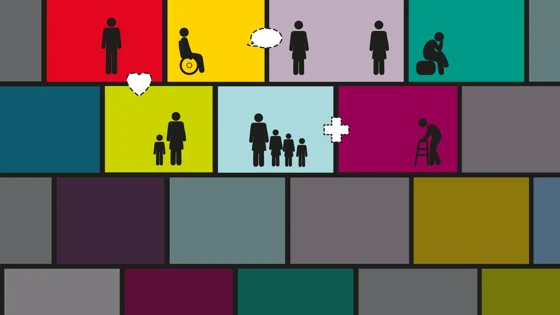A social calculus for COVID-19 policy: ensuring equity, social support, and co-production in the UK government response to the pandemic

Professor Bear’s contributions on issues of equality, the importance of co-production and socially grounded policy interventions have been central to the work of the Scientific Pandemic Insights Group on Behaviours (SPI-B) over the course of the COVID-19 pandemic.
What was the problem?
When the COVID-19 pandemic hit the UK in early 2020, and lockdown restrictions were imposed in late March, the disruptions to social support networks and communities were immense. Networks of informal and formal care changed rapidly with communities having to adapt traditional practices, including those around dying and bereavement, to new government regulations. The impacts on disadvantaged and minoritised groups were particularly stark.
As the pandemic progressed, different measures were introduced, such as local lockdowns. Again, the community and social costs of such measures were sizeable. With each new set of restrictions, the social implications were profound and needed to be rapidly understood by government and policymakers.
What did we do?
Professor Laura Bear has conducted extensive work on the anthropology of policy, including analysing the effects of austerity on relations of care and kinship. Her work has stressed the need for government decision-making to be informed by a social calculus and the public good to reduce entrenched disadvantage. In the UK context, Bear has argued for attention to be paid to whether public policies allow community networks of care and family relations to thrive.
Bear’s expertise in the anthropology of policy, ethnographic methods, and the concept of social calculus, led to her being invited in late March 2020 to join the UK government’s Scientific Pandemic Influenza Group on Behaviours (SPI-B), which advises the Scientific Advisory Group for Emergencies (SAGE) on behavioural interventions.
At the same time, Bear also convened a group of LSE anthropologists into the COVID and Care Research Group to research COVID-19’s unequal impacts on communities and their networks of care. This group has conducted rapid-response research throughout this period, focusing on disadvantaged and minoritised communities in London and the Midlands.
The LSE group’s first report, "‘A good death’ during the COVID-19 pandemic in the UK", explored the ways in which government communications and policy could support communities and households faced with COVID-19 deaths. Research explored "what a good death looks like" for people across all faiths. It examined how communities were adapting to new processes of dying, burial, funerals, and bereavement, and proposed policy measures to ameliorate the experience of loss and foster social cohesion. These included the assertion of a right to a dignified death; compassionate government communications around the scale of national loss; and dignified practices of death in hospitals and in crematoria.
Professor Bear then directed the LSE group from April 2020 onwards in a study of how national and local social restrictions had disrupted support networks, and in so doing disproportionately affected disadvantaged and minoritised groups. This work (based on extensive interviewing and a survey of 3,800 people) showed that, because government policy had initially not considered the significance of community care and kinship, it had broken relationships essential to socio-economic life. Alongside this, austerity had undermined financial support and links between third sector, community organisations, and local authorities. This left the UK ill-prepared to deal with and recover from the pandemic.
Further problems were caused by a rise in political blame narratives and a stigmatisation of minoritised communities or places under lockdown, particularly as national restrictions were replaced by local interventions from June 2020 onwards. Government rules were difficult to follow and caused alienation because they ran against the grain of social practices of childcare, religious life, and elder care, while prioritising economic opening. Overall, social recovery and cohesion were potentially placed at risk as a result of policies that had not yet fully adopted a social calculus and did not see the importance of social infrastructures.
What happened?
Since March 2020, Bear’s work has significantly impacted scientific advice provided by SAGE to the UK government. Her position, as the only anthropologist member of SPI-B and on the ethnicity subgroup of SAGE, meant she could contribute a unique perspective, shaping the design of government policy. She has led or co-authored 14 papers for SAGE on strategies related to: support bubbles; social restrictions and interventions; ethnicity and COVID-19 disparity; co-production; and community aid initiatives.
The "good death" report was produced in response to an urgent request from the Civil Contingencies Secretariat and Government Communication Service Behavioural Science Team (GCS). They wanted to understand attitudes and practices towards loss, funerals, and burial among different ethnic and faith communities. The key insights were circulated across numerous government departments. As a result, on 15 April 2020, the Health Secretary announced a range of new policies that would give families the "right to say goodbye to loved ones" in care homes, hospitals, and at funerals, and for the first time acknowledged the national losses.
In the first wave of the pandemic, families were unable to form support bubbles, except for childcare between separated parents. In early May 2020, SAGE asked SPI-B to explore the behavioural considerations around social bubbling as practised in New Zealand, Canada, and Guernsey. Drawing on the concepts of a social calculus, Professor Bear recommended that social connections between households should be prioritised in reopening, to relieve the burdens of care and enable extended networks in disadvantaged and minority groups to reconnect. This advice, supported by the pioneering research on social bubbles in New Zealand by her LSE colleague Dr Nick Long, was conveyed through SAGE to 10 Downing Street. The government subsequently prioritised childcare ties between households and single individuals in their recovery plan and broadened permitted support links during the second and third waves. Professor Bear held the government to account in relation to these issues by authoring articles in The Guardian and the Lancet.
The government’s May 2020 plans included provisions for local lockdowns to avoid further national restrictions. However, rapid research by the LSE COVID and Care Research group on their effects in the first local restriction area, Leicester, demonstrated the great social costs of this policy. Social support was restricted, and social cohesion and the legitimacy of the measures were adversely affected. The research, commissioned by Public Health England, informed briefings by SPI-B to SAGE, as did another paper with members of SPI-B on co-production. This emphasised how a more just set of social policies was possible, even in rapid response situations, by prioritising engagement with "local experts", namely individuals with interconnecting social networks, who can bring in usually excluded perspectives. The SPI-B briefings recommended this form of local planning through co-production with local public health teams. A broader debate on local interventions also began in the press, challenging the government’s approach.
The importance of community consultation in generating policy is at the core of Bear’s research. This became central to the UK government’s response to preventing transmission, improving vaccine uptake, and developing greater health equity. Bear co-authored a briefing for SAGE on community champions, particularly among disadvantaged and minority communities, informed by findings from LSE research. As a result, Bear has been advising the Ministry for Housing, Communities and Local Government (now the Department of Housing Communities and Local Government) on the design, implementation, and evaluation of its community champions policy. Drawing on her recommendations on supporting community recovery through cooperative efforts, 60 local authorities ran funded community champion schemes that contributed to vaccine uptake and general support during the pandemic. This approach, based on a social calculus and focusing on the construction of social infrastructures, has the potential to be the foundation for a more equitable recovery from the pandemic across the UK. Bear is now contributing to the British Academy’s social infrastructure policy and is leading a European Research Council collaborative research project to explore pandemic preparedness and recovery across the EU.

